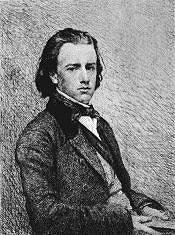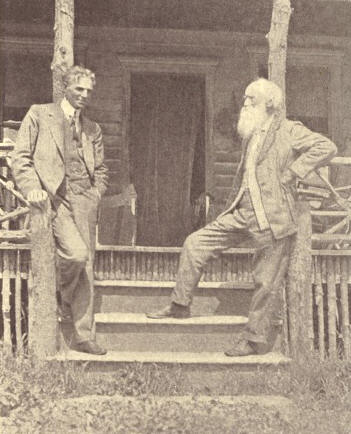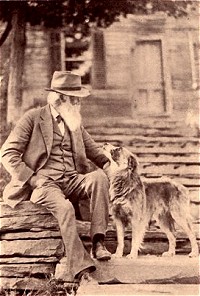|
John Burroughs was born on the family farm in
Roxbury, New York on April 3, 1837 and died on a train while returning
from California on March 29, 1921. He was buried on the farm on his
eighty-fourth birthday, April 3, 1921, at the foot of Boyhood rock on
which he had played as a child. In his time he was an immensely popular
nature writer. His popularity resided in the fact that readers
appreciated the way of life he wrote about and came to exemplify --- the
tantalizingly elusive yet universally accessible --- simple values,
simple means, simple ends.

By the time he was 20 years old Burroughs had moved from one
pole to the other as far as his feelings about writing were concerned.
From an early schoolboy aversion to any thought of writing, he had
become determined to be an author. In an 1857 letter to his bride of one
week he wrote,
"I sometimes think I will not make the kind of husband that will
always suit you. If I live, I shall be an author. My life will be one
of study. It may be a weakness in me to cherish the thoughts I do, but
I can't help it."
Endnote1
Approximately 10 years after this letter to Ursula, Burroughs issued
his first book, " Notes on Walt Whitman as Poet and Person." ;
(1867). It was the first Whitman biography to be published. When it
appeared, Burroughs had been working as a government employee in
Washington, D.C. for four years, practicing his craft at every
opportunity, polishing his skills, finding his niche. In her two-volume
set, The Life and Letters of John Burroughs, Clara Barrus wrote
that in the struggle of the maturing author, all early efforts were
experimental, directed to attaining clearness of expression. About the
time of the letter, Burroughs was being published in at least three
periodicals: The Bloomville Mirror, Saturday Press, and the New
York Leader. Much of what he wrote appeared under the pseudonyms
"Philomel" and "All Souls," along with titles like "Vagaries viz.
Spiritualism", "Fragments from the Table of an Intellectual Epicure",
and "Some of the Ways of Power." A good account of the early
experimental efforts can be found in Our Friend John Burroughs.
Endnote2
 |
 In
1871, four years after the appearance of Notes . . ., Wake-Robin
was published by Hurd and Houghton. In
1871, four years after the appearance of Notes . . ., Wake-Robin
was published by Hurd and Houghton.
Endnote3
It was the first book in which the familiar Burroughs, the writer of
essays about Nature, was distinctly present. It was the first in
what eventually became a set of 23 volumes of collected essays, the last
three of which were published posthumously. Subject matter of the 23
volumes is not limited to Nature, though it is the dominant theme.
Philosophy, literary criticism, and travel are also to be found in good
supply.
Barrus, Clara. The Life and Letters of John
Burroughs.Boston and New York: Houghton Mifflin Company, 1925. Vol.
I, Page 45.
Barrus, Clara. Our Friend John Burroughs.Boston
and New York: Houghton Mifflin Company, 1914. Pages 148-183.
Includes extracts from some of the essays, among which is one from
"A Thought on Culture", the first published work to bear his
signature. The extracts are nicely arranged to show how, gradually but
very definitely, Nature edged into the essays and ultimately became
the dominant theme. There is also a revealing glimpse into Burroughs'
attempts at poetry, a copy of his poem "Waiting," and a brief glance
at the influence of authors like Samuel Johnson, Henri Bergson, Ralph
Waldo Emerson, David Wasson, and Joel Benton on his writing.
After a series of name changes, it became
Houghton Mifflin Company.
© Copyright 1997 Johnburroughs.org. All rights
reserved.
Photo Left
Henry Ford and John Burroughs at
Woodchuck Lodge, Roxbury-in-the-Catskills
Photo by Albert Houghton Pratt
|

